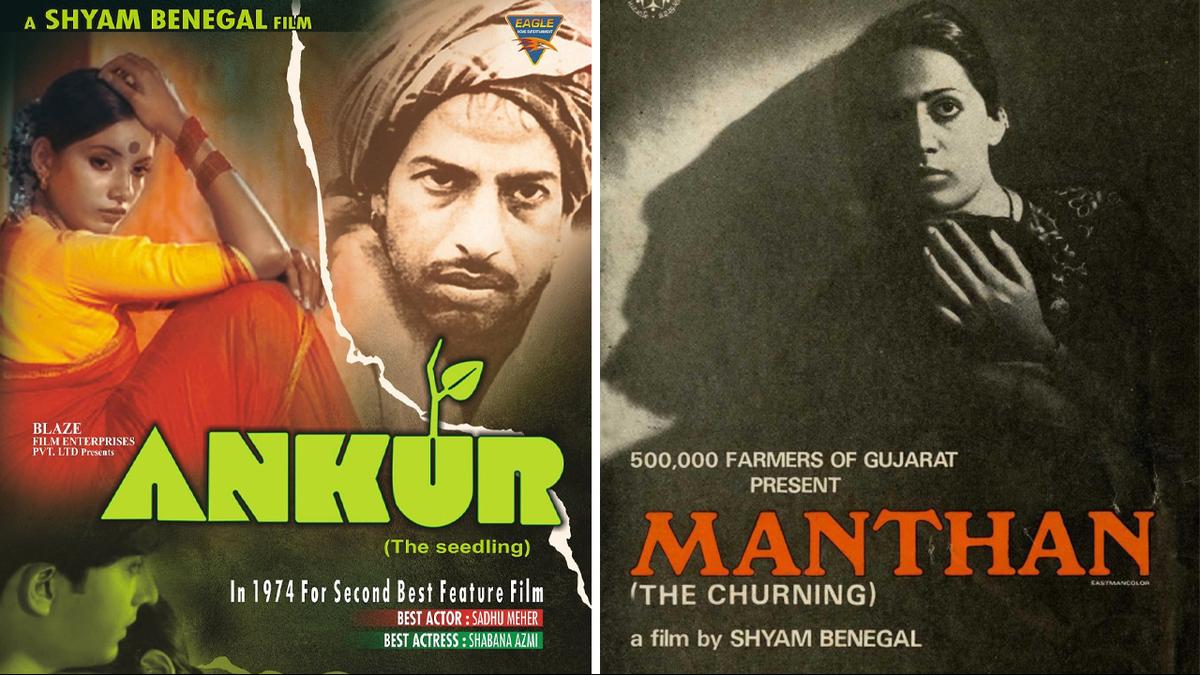
From ‘Ankur’ to ‘Kalyug’, the best films of Shyam Benegal
The Hindu
Shyam Benegal’s classic films such as ‘Ankur’, ‘Nishant’ and ‘Manthan’ explore social issues, and are marked by stellar performances
Filmmaker Shyam Benegal, who passed away at 90 on December 23, 2024 (Monday), made films that explored social issues, and relevant topics such as casteism, and politics. Set against rural backdrops and based on real-life stories, Benegal’s films were marked by stellar performances and pertinent themes that won widespread appreciation. Here is a list of Benegal’s best Hindi movies.
Considered a parallel cinema classic, the film is Shyam Benegal’s debut. Starring Anant Nag and Shabana Azmi, the film was reportedly based on a true story that occured in Hyderabad in 1950. Revolving around the central conflict of a village landlord’s son’s affair with a Dalit woman, the social drama portrayed the presence of casteism, skewed balance of power and perils of alcoholism. With cinematography from Govind Nihalani and Kamath Ghanekar, Ankur clinched three National Film Awards, including the Second Best Feature Film honour, and the Best Actress award for Shabana Azmi.
Based on the screenplay by popular playwright Vijay Tendulkar, the movie was a sharp portrayal of feudalism in Telangana. Starring Girish Karnad, Shabana Azmi, Amrish Puri and Anant Nag, the movie held a mirror up to the sexual exploitation of women and the abuse of power by the rural elite. For the movie, Benegal teamed up with his Ankur collaborators, cinematographer Govind Nihalani and music composer Vanraj Bhatia. Apart from winning the National Film Award for the Best Feature Film, the movie was picked to compete in the Palme d’Or at the 1976 Cannes Film Festival.
Touted to be the first crowd-funded Indian film, Benegal’s third film is considered to be an all-time classic. Set against the backdrop of White Revolution of India, the movie was crowdfunded by five lakh farmers. The movie showcases a set of poor farmers from Gujarat and their indomitable spirit. The movie featured Naseeruddin Shah, Girish Karnad, Smita Patil, Anant Nag and Amrish Puri. At the 77th Cannes Film Festival, a restored version was screened, with Naseeruddin Shah and Benegal attending the show. Vijay Tendulkar, who co-wrote the screenplay with Verghese Kurien, hailed as Father of White Revolution, won the National Film Award for the Best Screenplay.
Smita Patil delivers a powerful performance in this adaptation of the life of Hansa Wadkar, the famous Marathi stage and screen actor. The script was based on Hansa Wadkar’s memoir titled Sangtye Aika. Benegal co-wrote the screenplay with Girish Karnad while Satyadev Dubey wrote the dialogues for the Hindi movie. Smitha Patil, who convincingly portrayed the unconventional life of an artiste, clinched the National Award for Best Actress. Amol Palekar, Anant Nag, and Amrish Puri were the actors in the movie.
Based on Ruskin Bond’s novel A Fight of Pigeons, the movie marked Benegal’s collaboration with actor Shashi Kapoor, who produced the movie. Set against the backdrop of Indian Rebellion of 1857, the movie stars Shashi Kapoor, Naseeruddin Shah, Shabana Azmi and Nafisa Ali. While Govind Nihalani won the National Award in The Best Cinematographer category, the movie was adjudged the Best Feature Film in Hindi.
Narrating a tale of a brothel located in the centre of a city, Benegal’s offers a satirical comedy on politics and prostitution in this movie. The film is adapted from Ghulam Abbas’ Urdu short story Aanandi. The film featured an ensemble cast of Shabana Azmi, Smita Patil, Nina Gupta, Ila Arun and Naseeruddin Shah.

The Karnataka government has drafted a comprehensive master plan for the integrated development of Kukke Subrahmanya temple, the State’s highest revenue-generating temple managed by the Hindu Religious Institutions and Charitable Endowments Department. The redevelopment initiative is estimated to cost around ₹254 crore and aims to enhance infrastructure and facilities for devotees.












